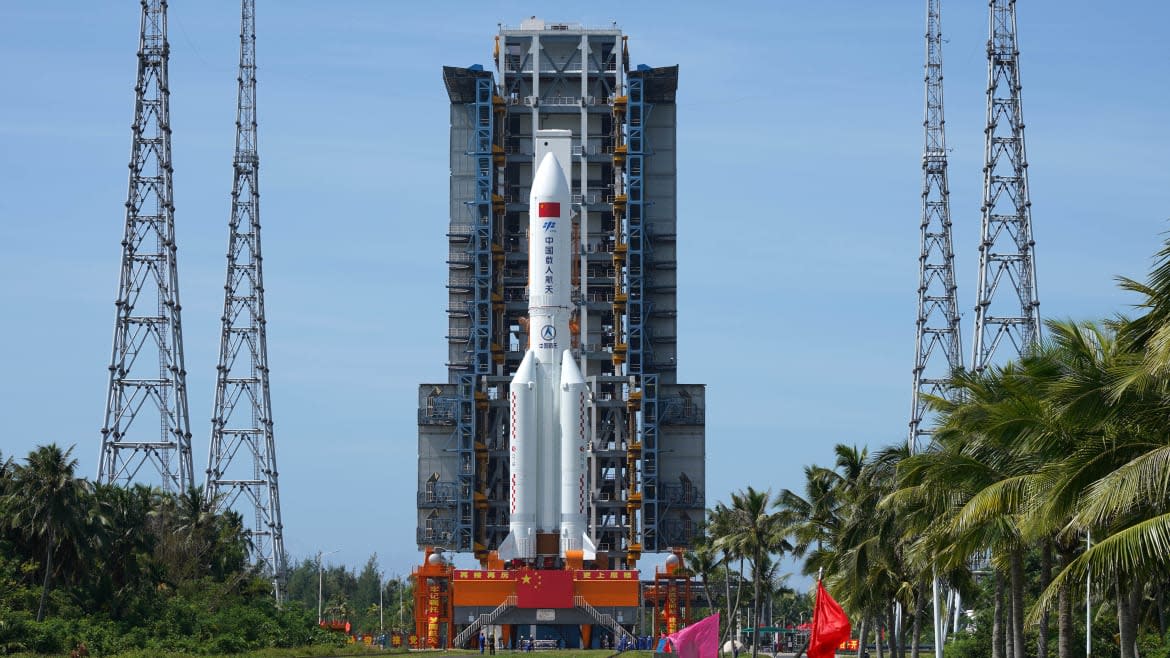Out-of-Control Chinese Rocket May Land on Your Head Sunday

A used Chinese rocket booster is set to fall out of orbit and crash into Earth sometime in the next few days. The nonprofit Aerospace Corporation’s debris tracking experts predict that the rocket—a 10-story, 23-ton core stage of a Long March 5B mission launched July 24 to deliver the Wentian lab module to the country’s Tiangong space station—will careen to Earth on July 31 at 3:52 a.m. Eastern Time, plus or minus 22 hours.
While the chance of the rocket hitting a populated community is slim, it’s still possible. “Due to the uncontrolled nature of its descent, there is a non-zero probability of the surviving debris landing in a populated area—over 88 percent of the world’s population lives under the reentry’s potential debris footprint,” the Aerospace Corporation said in a statement. About 60 to 80 percent of the booster’s mass will burn up in the atmosphere, but that still leaves a hefty, fiery object ready to slam into the ground.
This is the third time that a Long March 5B booster has fallen back to Earth uncontrollably and raised alarms. In May 2020, a booster crashed into an uninhabited plot of land on the African West Coast.
Our latest prediction for #CZ5B rocket body reentry is:
🚀 31 Jul 2022 07:52 UTC ± 22 hours
Reentry will be along one of the ground tracks shown here. It is still too early to determine a meaningful debris footprint. Follow this page for updates: https://t.co/SxrMtcJnj0 pic.twitter.com/xsDqC8rOEt— The Aerospace Corporation (@AerospaceCorp) July 26, 2022
The second Chinese booster incident, in May 2021, was more infamous. For several days, the space community had a harder time predicting and assessing where it would land. The world waited with bated breath for several hours until it was finally confirmed the booster landed in the Indian Ocean near the Maldives. NASA, among others, expressed severe irritation with the Chinese handling of the booster. (NASA did not respond to requests from The Daily Beast for immediate comment.)
China’s response over its uncontrolled boosters in the past has always ranged from complete silence to accusing the U.S. and others of scaremongering folks (which they’ve done again in response to this latest instance). Most core stages, reports Gizmodo, aren’t supposed to reach orbit, and their trajectories are instead designed to guide them back to landing in the ocean or a very remote location on land. China, however, has consistently elected to send its Long March 5B core booster into orbit and let it tumble back to Earth willy-nilly.
Debris trackers around the world will have a better sense in the next few days of where the booster may land Sunday, but it will still be tough to predict an exact location ahead of time. Sunday morning will be a tense time for a large swath of the world.
Get the Daily Beast's biggest scoops and scandals delivered right to your inbox. Sign up now.
Stay informed and gain unlimited access to the Daily Beast's unmatched reporting. Subscribe now.

